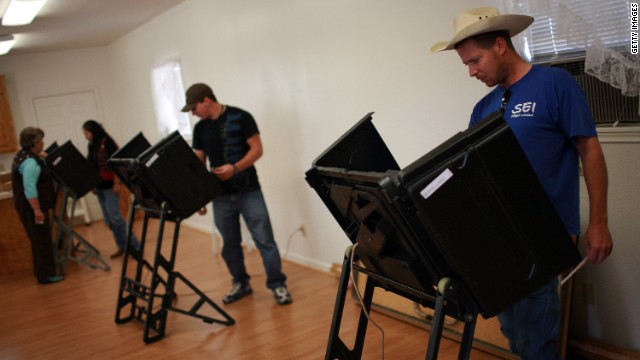
1 hour ago
Texas, international election monitors face off
Washington (CNN) – The presence of international monitors observing next week's presidential and Congressional election has caused a firestorm among voter ID law supporters and, particularly, the Texas attorney general.
The reservations came after the Organization for Security and Cooperation in Europe (OSCE) announced it is sending dozens of monitors from around the world to monitor the upcoming presidential and Congressional elections.
– Follow the Ticker on Twitter: @PoliticalTicker
– Check out the CNN Electoral Map and Calculator and game out your own strategy for November.
The OSCE, which sends monitoring teams to elections around the world, has been observing U.S. elections since 2002, when the Bush administration invited them after the hotly contested 2000 presidential election. They are expected to observe in 15 states on November 6th.
Texas Attorney General Greg Abbott Thursday wrote a letter to Secretary of State Hillary Clinton expressing his displeasure with the OSCE's approach, stating that "an unnecessary political agenda may have infected OSCE's election monitoring." Texas law, he notes, does not allow "unauthorized individuals" within 100 feet of polling places. He asked Clinton to work with the OSCE to ensure the group abides by the state law or they will risk "legal consequences."
OSCE's team for the U.S. elections has 13 international experts based in Washington D.C. and 44 long-term observers to be deployed throughout the country. The OSCE called it "the largest Organization for Security and Cooperation in Europe parliamentary delegation to ever observe a North American election."
"We are not coming to judge a result but to report about the process," said Joao Soares, a Portuguese member of parliament who is helping coordinate monitoring effort, in a statement on the group's website. "In a country so well-known for its diverse citizenry, we will observe how inclusive the election process is in line with the country's own laws and international election commitments."
The monitoring team issued an interim report last week warning "recent state-level legislative initiatives to limit early voting and introduce stricter voter identification have become highly polarized. Democrats are concerned that these would disenfranchise eligible voters, while Republicans believe they are necessary to protect the integrity of the vote."
This week a group of civil rights groups, including the National Association for the Advancement of Colored People (NAACP), the American Civil Liberties Union (ACLU) and the League of Women Voters, sent a letter to Daan Evarts, head of the OSCE mission, urging him to send monitors to states where voter ID laws and early voting restrictions "voting have been most extensive-Pennsylvania, Ohio, Florida, Texas and Wisconsin."
The letter also urged Everts to send monitors to Colorado, North Carolina and Virginia. Most of these are considered battleground states in the presidential election.
In a letter to Everts, Texas Attorney General Abbott noted the OSCE identified voter ID laws as a barrier to the right to vote and is being urged by voter ID opponents "to monitor states that have taken steps to protect ballot integrity by enacting voter ID laws."
"The OSCE may be entitled to its opinions about voter ID laws, but your opinion is legally irrelevant in the United States, where the Supreme Court has already determined that voter ID laws are constitutional," Abbott wrote. "Groups and individuals from outside the United States are not allowed to influence or interfere with the election process in Texas."
In addition to visiting polling stations on Election Day, the OSCE monitors have already met with federal, state and local officials and candidates since starting their work earlier this month, according to the Vienna-based agency.
But in his letter to Everts, Texas Attorney General Greg Abbott warned OSCE representatives are not authorized by Texas law to enter a polling place and then stated they could face criminal prosecution for coming within 100 feet of a polling place.
State Department Spokesperson Victoria Nuland said Texas was the only state to her knowledge that came forward with reservations, but that the OSCE has since sent a letter, both to Secretary of State Hillary Clinton and to Texas authorities reassuring them that "OSCE observers are committed to following all U.S. laws and regulations as they do in any country where they observe elections."
But Janez Lenarčič, the Director of the OSCE Office for Democratic Institutions and Human Rights which oversees election monitoring, also shared his concerns about Abbot's threats in his letter to Clinton.
"The threat of criminal sanctions against OSCE/ODIHR observers is unacceptable," Lenarčič said. "The United States, like all countries in the OSCE, has an obligation to invite ODIHR observers to observe its elections."
He called concerns that election observers would interfere with the election process "groundless" and stressed OSCE observers adhere to all national laws of the countries whose elections they are monitoring.
"Our observers are required to remain strictly impartial and not to intervene in the voting process in any way," Lenarčič said. "They are in the United States to observe these elections, not to interfere in them."
No comments:
Post a Comment